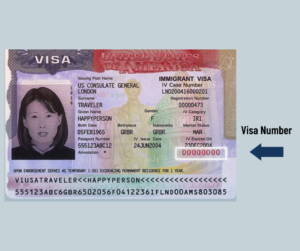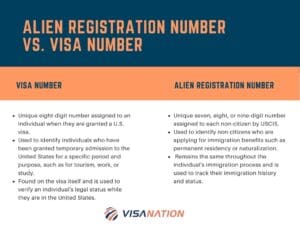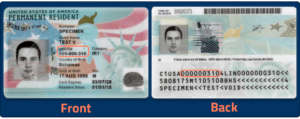Find Your Visa Number on Your U.S. Visa in 2023
Many forms and immigration applications for the purpose of receiving benefits generally ask for your visa number. You may be wondering where it is located. In this guide, we’ll go over what exactly the visa number is, where to find it, and more!
You may hear the word visa foil number used interchangeably for visa number. They are both the red number located on the bottom right side of your visa document. Other information written on the visa is in black ink, so the visa number will stand out more easily. It typically contains 8 characters and sometimes one letter followed by seven numeric characters. These are randomly generated and are each unique. They may be located somewhere different than the bottom right-hand corner of the visa (depending on when the U.S. visa was issued) but that’s normally where they are. When you travel, the Customs and Border Protection officers will check your visa number to verify your legal authorization to enter.
If you have a B-2 or F-1 student visa, this number is temporary. For green cards, the visa number is permanent. If you received an electronic visa, you can find the visa number on the approval notice or the confirmation page that you received when you applied for the visa. It’s necessary to mention that not all non-citizens are issued a U.S. visa. Some individuals may enter the United States without a visa through the Visa Waiver Program, while others may be eligible to adjust their status while in the United States without the need for a visa.
Other components of a U.S. visa include:
- Visa holder’s first and last name
- Issuing port name
- Sex – male or female
- Date of birth
- Nationality
- Passport number
- Visa type
- Entries – the number of times the visa can be used to come into the United States
- Issuing date – when the visa was issued
- Expiration date
- Annotations/Notes
The officials at Customs and Border Protection will verify the information on the visa for each individual who tries to gain entry into the U.S. by matching it with the information available in the system.
How to Get a U.S. Visa Number
You must first apply and receive a U.S. visa before you can get a visa number. There are both non-immigrant and immigrant visas, including those that are granted to spouses and relatives of U.S. citizens.
Normally to kick off the U.S. visa application, you’ll need to submit Form DS-160 or DS-260 online or with a U.S. embassy, then pay the visa application fee. You’ll then need to schedule a visa interview with a local embassy or consulate, collect and submit the required documents and then attend your visa interview. The immigration officials will either deny or approve your application and then you’ll send the visa and your passport to the address you list on file. For non-immigrant visas, it will have a predetermined validity period, while immigrant visas are for permanent residency. It’s important to know how to locate your visa number or non-immigrant visa number because it will be referenced when you travel in and out of the U.S.
Difference Between Alien Number and Visa Number
The Alien Registration Number and visa number are two separate identification numbers used by officials to track the immigration status of individuals. While both numbers are important for immigration purposes, they serve different functions.
The Alien Registration Number, also known as an A-number, is a unique seven, eight, or nine-digit number assigned to each non-citizen by the United States Citizenship and Immigration Services (USCIS). It is used to identify non-citizens who are applying for immigration benefits such as permanent residency or naturalization. The A-number remains the same throughout the individual’s immigration process and is used to track their immigration history and status.
On the other hand, a Visa Number is a unique eight-digit number assigned to an individual when they are granted a U.S. visa. It is used to identify individuals who have been granted temporary admission to the United States for a specific period and purpose, such as for tourism, work, or study. The visa number is typically found on the visa itself and is used to verify an individual’s legal status while they are in the United States.
If an individual has been issued a visa, the visa number will typically be found on the visa itself, either in the top right corner or at the bottom of the visa page. In contrast, the Alien Registration Number can be found on a variety of documents related to an individual’s immigration status, including their green card, work permit, or Employment Authorization Document (EAD). It can also be found on any notices or correspondence from USCIS regarding an individual’s immigration case.
Below you can see where the Alien Number is located on a Green Card. Some older green cards, issued between 2004 and 2010, have the Alien Registration Number listed as “A#.”
Your immigrant visa in your passport—also known as a visa stamp/visa foil—also contains your A-Number. You can locate it on the right-hand side below your case number.
While both the Alien Registration Number and Visa Number are important for tracking the immigration status of non-citizens in the United States, they serve different functions. The A-number is used to track an individual’s immigration history and status, while the visa number is used to verify an individual’s legal status while they are in the United States. The Alien Registration Number can be found on a variety of documents related to an individual’s immigration status, while the visa number is typically found on the visa itself.
Likewise, a PERM case number is also not the same as an alien registration number. The PERM Labor Certification Case number is 11 digits and assigned by the Department of Labor for PERM Labor Certification applications. If you have further questions about the different numbers on your immigration documents, it’s best to consult an experienced immigration attorney.
Frequently Asked Questions
Below are some frequently asked questions about U.S. visa numbers.
How many digits is a U.S. visa number?
The visa number is typically 8 digits but the format can vary depending on the type of visa and the issuing body.
Is visa number the same as visa availability number?
It’s important to know that these are very different things. Visa number availability, which is also referred to as immigrant visa number availability, refers to the requirement that for certain categories of individuals seeking permanent residence (commonly known as a “green card”) in the United States, an immigrant visa number must be currently available (as indicated by the Visa Bulletin) in order for them to be granted permanent residence. It’s crucial not to confuse these two terminologies. Visa number is the 8-character number located on your actual visa.
Does a U.S. visa have a number?
Yes, it has a visa number.
Do F-1 Students Get Alien Registration Numbers?
F-1 visa holders with employment authorization get an Alien Registration Number, even if they are not trying to apply for a green card.
Is U.S. visa number the same as the control number?
No, the U.S. visa number and the control number are not the same. The U.S. visa number is an eight-digit number that is assigned to an individual when they are granted a U.S. visa. The control number, on the other hand, is a 11-digit number that is assigned to a visa application by the U.S. Department of State’s Consular Electronic Application Center (CEAC). The control number is used to track the visa application and is also known as the CEAC bar code.
How can I check my immigration status?
You can check for your USCIS case status online by entering your receipt number.








